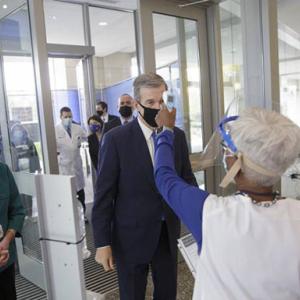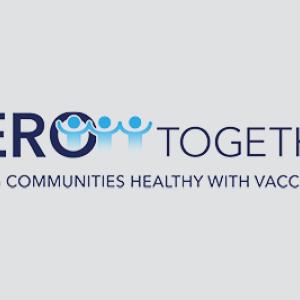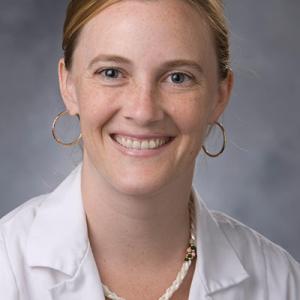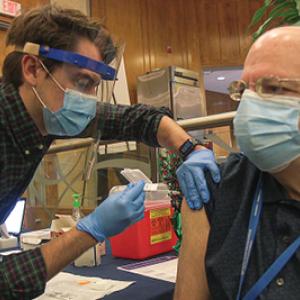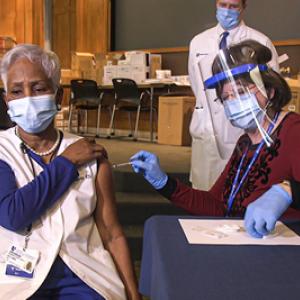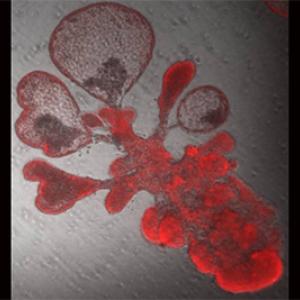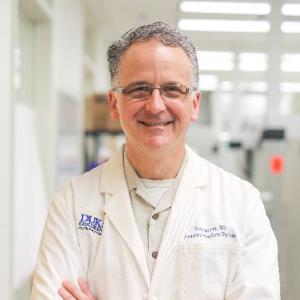Governor Cooper visits Duke University School of Medicine
Cooper thanks frontline workers as they receive their vaccinations
On Monday, Governor Roy Cooper visited the Duke University School of Medicine to tour the COVID-19 vaccination area. He was greeted at the door by Faye Williams, a retired VA nurse and now visitor screener at Duke, who was the first person in the Triangle to receive a COVID-19 vaccination.
Cooper greeted and thanked many Duke Health employees as he made his way through the School of Medicine to the vaccination area.
DCRI, Verily, and HERO Registry to support long-term safety study of COVID-19 vaccine
The Duke Clinical Research Institute (DCRI) and Verily are utilizing the HERO Registry and community to launch a study to gain long-term insights about the COVID-19 vaccine developed by Pfizer and BioNTech, including real-world safety data. This study, which is funded by Pfizer, will follow vaccinated healthcare workers for two years to assess their experiences after receiving the vaccine.
Clinician feedback helps basic scientists determine COVID-19 research priorities
A team of Duke scientists and clinicians are working together to bridge the knowledge gap between patient care and basic science research associated with COVID-19.
Emily Ko, MD, PhD, assistant professor of medicine and hospitalist at Duke Regional Hospital, recently developed and distributed a survey to clinicians working on the frontlines, asking them about what they’ve observed in terms of patient symptoms, complications, infection, and re-infection in hospitalized patients with COVID-19.
Barton Haynes answers the essential questions about the COVID vaccine
Director of Duke Human Vaccine Institute on the safety and efficacy of the vaccine and what comes next
Dr. Barton Haynes received his first dose of the COVID-19 vaccine Wednesday with the confidence of a researcher who has spent his entire career studying the science of vaccines.
Amazing day: a historic moment in the battle against COVID-19
A flurry of activity surrounded Faye Williams as she signed form after form. Dressed in her Duke blue scrubs and wearing her lucky pearls, she sat patiently as she and those around her prepared to make history in a Searle Center conference room at Duke.
Williams was the first of 12 Duke employees to receive the Pfizer/BioNTech COVID-19 vaccine at Duke Health System. For her, it was a moment of personal health, professional safety and communal responsibility.
To convince vaccine skeptics, use empathy, information and a re-start, experts say
With multiple COVID-19 vaccines on the way in the United States, public health officials now face the daunting challenge of convincing skeptics to actually get the vaccine.
Three Duke experts in public health messaging, leadership and human behavior spoke with journalists Thursday in a virtual media briefing about challenges and solutions.
Replay the briefing on YouTube.
Duke-NUS study uncovers why bats excel as viral reservoirs without getting sick
Study confirms bats adopt multiple strategies to reduce pro-inflammatory responses, thus mitigating potential immune-mediated tissue damage and disease. Findings provide important insights for medical research on human diseases.
Bats act as reservoirs of numerous zoonotic viruses, including SARS-CoV, MERS CoV, Ebola virus, and—most likely—SARS-CoV-2, the pathogen behind the ongoing coronavirus pandemic. However, the molecular mechanisms bats deploy to tolerate pathogenic viruses has remained unclear.
Lab-grown mini-lungs mimic the real thing - right down to COVID infection
A team of Duke University researchers has developed a lab-grown living lung model that mimics the tiny air sacs of the lungs where coronavirus infection and serious lung damage take place. This advance has enabled them to watch the battle between the SARS-CoV-2 coronavirus and lung cells at the finest molecular scale.
2020 Flu Season: What To Know
The 2020 flu season is upon us and like many, we have questions and concerns. We talked to Duke Human Vaccine Institute investigator, Tony Moody, MD for answers.
Dr. Tony Moody is an Associate Professor in the Department of Pediatrics, Division of Infectious Diseases and the Department of Immunology at Duke University Medical Center. He also serves as the director of the Duke CIVICs Vaccine Center (DCVC) at DHVI and co-director of the Centers for Research of Emerging Infectious Disease Coordinating Center (CREID-CC).
Flu and COVID: why public trust in vaccines is so critical
Trio of Duke experts address threat of a 'twindemic' and development of a COVID vaccine
Not sure whether to get a flu shot this year?
The flu has similar symptoms to COVID-19, and while you don’t want either virus, you certainly don’t want both, three Duke vaccine experts said Friday in urging people to seek out the flu vaccine as it becomes available this fall.
Speaking to reporters in a virtual media briefing, the three scientists discussed flu season, the development of a COVID-19 vaccine, and why public trust in vaccines is so critical.
